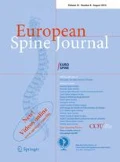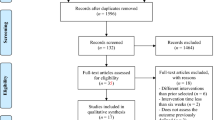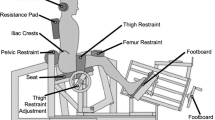Abstract
In a randomized, observer-blinded trial, the effectiveness of 3-month high-intensity training (HIT) of the isolated lumbar extensors was compared to low-intensity training (LIT). Eighty-one workers with nonspecific low back pain longer than 12 weeks were randomly assigned to either of the two training programs.
Training sessions were performed on a modified training device that isolated the lower back extensors. Total intervention time was limited to 5–10 min (one or two training sessions) per week. Training effects were assessed in terms of changes in self-rated degree of back complaints, functional disability, and general, physical and mental health. Secondary outcomes in this study were muscle strength and fear of moving the back (kinesiophobia). Outcomes were evaluated at 1,2, 3, 6, and 9 months after randomization.
The results showed that the two treatment programs led to comparable improvements in all outcome measures, except for mean isometric strength at 1, 2, 3, 6, and 9 months and kinesiophobia score at 2 and 9 months of follow-up. The high-intensity training group showed a higher strength gain (24 to 48 Nm) but a smaller decline in kinesiophobia (2.5 and 3.4 points, respectively), compared to the low-intensity training group.
It can be concluded that high-intensity training of the isolated back extensors was not superior to a non-progressive, low-intensity variant in restoring back function in nonspecific (chronic) low back pain. In further research, emphasis should be put on identifying subgroups of patients that will have the highest success rate with either of these training approaches.



Similar content being viewed by others
References
Beurskens AJ, de Vet HC, Köke AJ, van der Heijden GJ, Knipschild PG (1995) Measuring the functional status of patients with low back pain. Assessment of the quality of four disease-specific questionnaires. Spine 20:1017–1028
Bronfort G, Goldsmith CH, Nelson CF, Boline PD, Anderson AV (1996) Trunk exercise combined with spinal manipulative or NSAID therapy for chronic low back pain: A randomized, observer-blinded clinical trial. J Manipulative Physiol Ther 19:570–582
Darden E (1990) The Nautilus Book. Contemporary Books, Chicago
Fairbank JC, Couper J, Davies JB, O’Brien JP (1980) The Oswestry low back pain disability questionnaire. Physiotherapy 66:271–273
Graves JE, Webb DC, Pollock ML, Matkozich J, Leggett SH, Carpenter DM, Foster DN, Cirulli J (1994) Pelvic stabilization during resistance training: Its effect on the development of lumbar extension strength. Arch Phys Med Rehabil 75:210–215
Hansen FR, Bendix T, Skov P, Jensen CV, Kristensen JH, Krohn L, Schioeler H (1993) Intensive, dynamic back-muscle exercises, conventional physiotherapy, or placebo-control treatment of low-back pain: A randomized, observer-blind trial. Spine 18:98–108.
Kori SH, Miller RP, Todd DD (1990) Kinisiophobia: A new view of chronic pain behavior. Pain Management Jan/Feb:35–43
Kuukkanen T, Mälkiä E (1996) Muscular performance after a 3 month progressive physical exercise program and 9 month follow-up in subjects with low back pain. A controlled study. Scand J Med Sci Sports 112–121
Leggett SH, Mooney V, Matheson LN, Nelson B, Dreisinger T, van Zytveld J, Vie L (1999) Restorative exercise for clinical low back pain: a prospective two-center study with 1-year follow-up. Spine 24:889–898
Ljunggren AE, Weber H, Kogstad O, Thom E, Kirkesola G (1997) Effect of exercise on sick-leave due to low back pain. Spine 22:1610–1617
Manniche C, Lundberg E, Christensen I, Bentzen L, Hesselsøe G (1991) Intensive dynamic back exercise for chronic low back pain: a clinical trial. Pain 47:53–63
Mannion AF, Müntener M, Taimela S, Dvorak J (1999) A randomised clinical trial of three active therapies for chronic low back pain. Spine 24:2435–2448
Mannion AF, Junge A, Taimela S, Müntener M, Lorenzo K, Dvorak J (2001) Active therapy for chronic low back pain: part 3. Factors influencing self-rated disability and its change following therapy. Spine 26:920–929
Marras WS (2000) Occupational low back disorder causation and control. Ergonomics 43:880–902
McHorney CA, Kosinski M, Ware JE Jr (1994) Comparisons of the costs and quality of norms for the SF-36 health survey collected by mail versus telephone interview: Results from a national survey. Med Care 32:551–567
Mior S (2001) Exercise in the treatment of chronic pain. Clin J Pain 17:S77–85
Pocock SJ, Assmann SE, Enos LE, Kasten L (2002) Subgroup analysis, covariate adjustment and baseline comparisons in clinical trial reporting: current practice and problems. Stat Med 21:2917–2930
Pollock ML, Leggett SH, Graves JE, Jones A, Fulton M, Cirulli J (1989) Effect of resistance training on lumbar extension strength. Am J Sports Med 17:624–629
Rasbash J, Browne W, Goldstein H, Yamg M, Plewis I, Draper D, Healy M, Woodhouse G (1999) A user’s guide to MlwiN. Institute of Education, London
Risch SV, Norvell NK, Pollock ML, Risch ED, Langer H, Fulton M, Graves JE, Leggett SH (1993) Lumbar strengthening in chronic low back pain patients. Spine 18:232–238
Rissanen A, Kalimo H, Alaranta H (1995) Effect of intensive training on the isokinetic strength and structure of the lumbar muscles in patients with chronic low back pain. Spine 20:333–340
Roland M, Morris R (1983) A study of the natural history of back pain. I. Development of a reliable and sensitive measure of disability in low-back pain. Spine 8:141–144
Shmueli A (1998) The SF-36 profile and health-related quality of life: an interpretative analysis. Qual Life Res 7:187–195
Tulder van M, Malmivaara A, Esmail R, Koes B (2000) Exercise therapy for low back pain: a systematic review within the framework of the Cochrane Collaboration Back Review Group. Spine 25:2784–2796
Vlaeyen JW, Kole-Snijders AM, Boeren RG, van Eek H (1995) Fear of movement/(re)injury in chronic low back pain and its relation to behavioral performance. Pain 62:363–372
Vlaeyen JW, Kole-Snijders AM, Rotteveel AM, Ruesink R, Heuts PH (1995) The role of fear of movement/(re)injury in pain disability. J Occup Rehabil 5:235–252
Vrijens J (1984) Basis voor verantwoord trainen. PVLO, Gent, p 120
Vuori IM (2001) Dose-response of physical activity and low back pain, osteoarthritis, and osteoporosis. Med Sci Sports Exerc 6:S551–586
Ware J, Sherbourne C (1992) The MOS 36 item Short Form Health Survey (SF-36). Med Care 30:473–483
van der Zee K, Sanderman R (1993) Het meten van de algemene gezondheidstoestand met de RAND-36: Een handleiding. Noordelijk Centrum voor Gezondheidsvraagstukken, Groningen
Author information
Authors and Affiliations
Corresponding author
Rights and permissions
About this article
Cite this article
Helmhout, P.H., Harts, C.C., Staal, J.B. et al. Comparison of a high-intensity and a low-intensity lumbar extensor training program as minimal intervention treatment in low back pain: a randomized trial. Eur Spine J 13, 537–547 (2004). https://doi.org/10.1007/s00586-004-0671-y
Received:
Revised:
Accepted:
Published:
Issue Date:
DOI: https://doi.org/10.1007/s00586-004-0671-y




